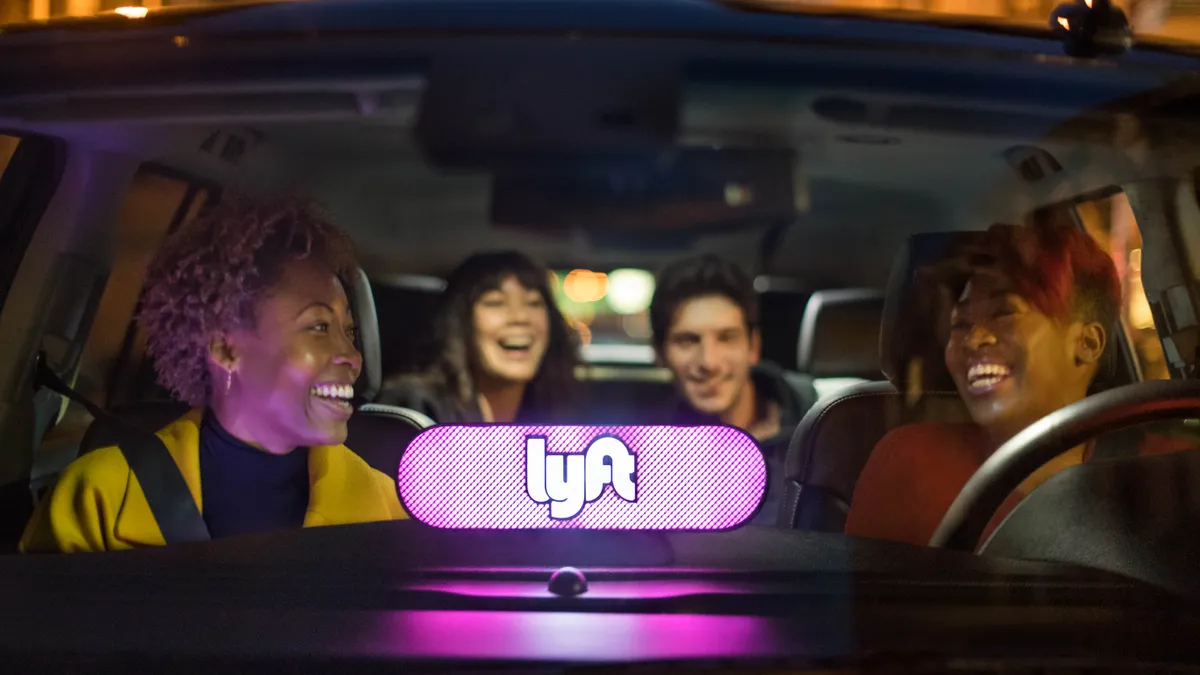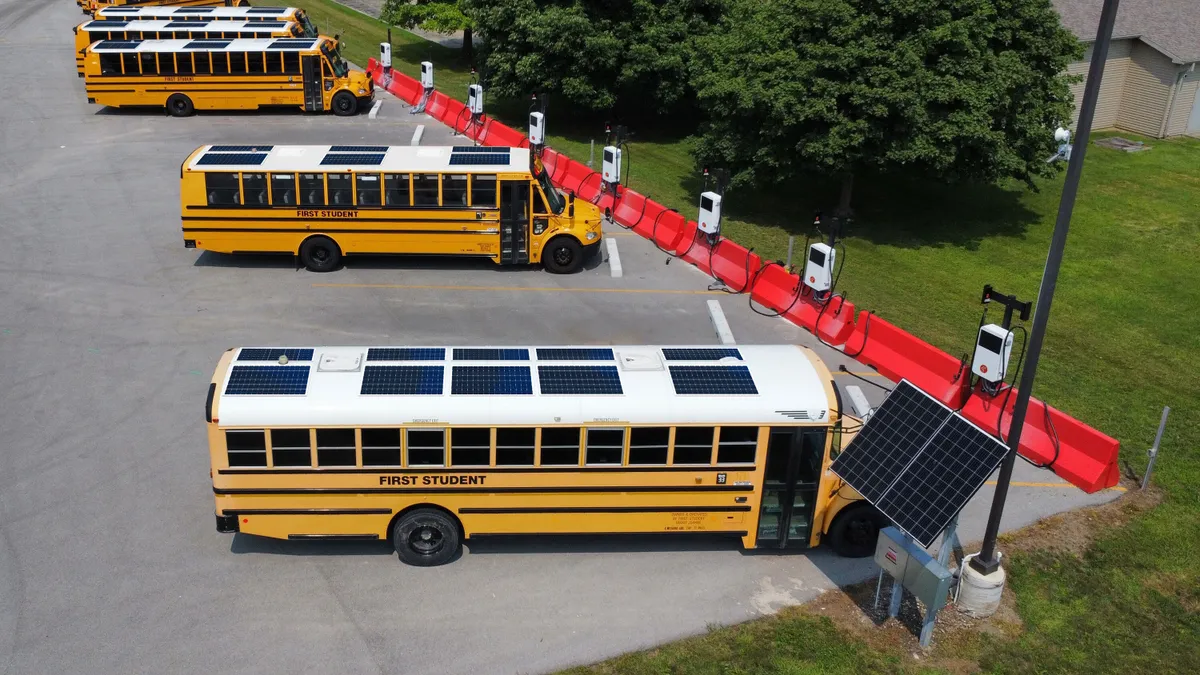The approval of California’s Proposition 22 on Tuesday could empower ride-hailing companies to further challenge industry regulations, experts said.
The California Secretary of State projected on Wednesday morning that the statewide ballot initiative received around 58% of the vote, with results to be fully certified by Dec. 11.
In an email to riders in the state, Uber CEO Dara Khosrowshahi said the "future of independent work is more secure" because of the yes vote. Separately, an Uber spokesperson said in an email that local voters "agreed that instead of eliminating independent work, we should make it better."
Lyft Chief Policy Officer Anthony Foxx noted the proposition's benefits for drivers — something the companies emphasized throughout campaign season.
"California voters have spoken, and they stood with more than a million drivers who clearly said they want independence plus benefits," Foxx said in an emailed statement. "[Lyft] stands ready to work with all interested parties, including drivers, labor unions and policymakers, to build a stronger safety net for gig workers in the U.S."
Prop 22 creates a separate classification in California labor law for delivery and ride-hailing drivers to stay as independent contractors rather than be classified as employees under the state's AB5 law, which passed last year. The law aimed to end what elected officials said was the misclassification of workers as independent contractors when they are treated as employees.
Under the terms of Prop 22, those that drive at least 15 hours a week will receive money for healthcare benefits up to 100% of the average employer payment toward a Covered California health plan (supporters estimate that to be on average $367 a month to each driver); an earnings guarantee equal to 120% of the minimum wage; medical and disability coverage; an appeals process for deactivated drivers; and protections against discrimination and sexual harassment.
Those extra benefits had been floated by Uber earlier this year and were added to the proposition after negotiations with labor unions. While there is no specific monetary value available on the cost of offering these benefits to California drivers, a paper from The Center for Growth and Opportunity at Utah State University entitled "Barriers to Portable Benefits Solutions for Gig Economy Workers" notes that Uber said in its initial public offering (IPO) last year, it would "incur significant additional expenses" if required by law to increase compensation or benefits for drivers.
Supporters said the initiative should be an example to the rest of the country, especially as governments at all levels consider ways to regulate the ride-hailing industry, including its labor market. New York City and Seattle were the first to pass city-level regulations on ride-hailing, including a minimum wage for drivers, but supporters of the proposition in California argued rules must take into account drivers' other needs.
"This vote in one of the most progressive states in the country should send a strong signal to elected leaders all over the nation," Jan Krueger, a part-time Lyft driver, said in a statement released by Yes on 22, which advocated for the proposition's passage. "Drivers want and need to be independent. We can protect independent work while also offering drivers new benefits. Prop 22 should serve as a model for other states and the federal government to follow."
Public polling showed broad support among drivers in California for staying as independent contractors, something that formed what Harry Campbell, founder of blog The Rideshare Guy and author of The Rideshare Guide, said formed a "compelling message" for the gig economy companies as they campaigned for the proposition’s passage.
"This vote in one of the most progressive states in the country should send a strong signal to elected leaders all over the nation."

Jan Krueger
Yes on 22 Campaign
Those companies spent upwards of $200 million to do so, including sending messages to riders in the state through their apps in a bid to appeal to voters directly. In a statement released by the opposition No on Prop 22 campaign, Art Pulaski, Executive Secretary Treasurer of the California Labor Federation (CLF), criticized the companies for spending an "obscene amount of money… misleading the public."
"Companies shouldn't be able to buy elections," the Gig Workers Collective, a nonprofit that advocates for gig economy workers, wrote in a blog post.
Campbell said such a push could have backfired, given Uber and Lyft’s previous dalliances in electoral politics. In 2016, the pair spent more than $8 million in Austin, TX to unsuccessfully try and overturn the city's rules on ride-hailing, but that plan backfired amid criticism of the companies' spending. They only returned to Austin this year. But Campbell said various factors, including drivers' preference for their independent contractor status, combined to get Prop 22 over the line.
"When you're a voter in California, and you see that Uber and Lyft are telling you this is something drivers overwhelmingly want, and combine that with the fact that it's a service that consumers love — very few consumers have issues with Uber and Lyft, and even food delivery services, especially during the pandemic," Campbell said in an interview. "I think those two factors made it really easy for a lot of people to vote yes."
Campbell noted the parallels with Massachusetts, which has a law similar to AB5 on its books: the Massachusetts Independent Contractor Law (MICL). The state legislature amended the legislation in 2004, but it is not as strictly enforced as California's AB5, actions that prompted court challenges and orders and a threat from Uber and Lyft to leave the state.
Meanwhile, the result in California prompted gig worker advocacy groups to call for state legislatures nationwide to enact protections for drivers and delivery workers. In a statement, Brendan Sexton, Executive Director of the Independent Drivers Guild (IDG), a Machinists Union affiliate which advocates for more than 200,000 Uber and Lyft drivers in New York, New Jersey and Connecticut, said the "gig worker fight has only just begun."
IDG noted that while the majority of gig workers want to unionize, they are blocked from doing so by the National Labor Relations Board (NLRB), which found them ineligible to do so.
"California's experience should light a fire under pro-worker state legislatures across the country. States need to act now to stand up for their workers," Sexton said. "Today we call upon legislatures in New York and New Jersey, as well as other states, to move swiftly to empower these workers and their unions with full collective bargaining rights at the state level and real worker protections. Worker power through collective bargaining, not ballot measures and protracted legal battles, is the only real long-term solution for gig workers."
Opponents, while chastened by defeat at the ballot box, say their work to advocate for good labor practices is well underway.
"The end of this campaign is only the beginning in the fight to ensure gig workers are provided fair wages, sick pay and care when they're hurt at work," Pulaski said.




















